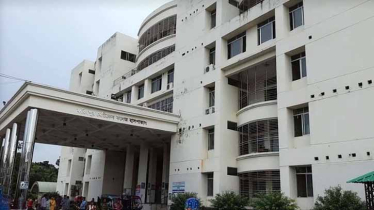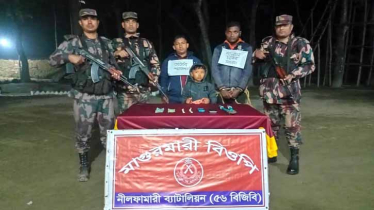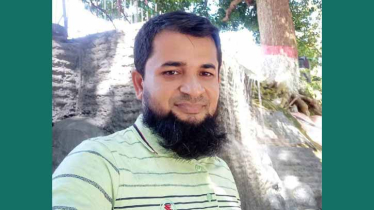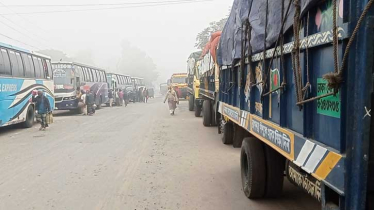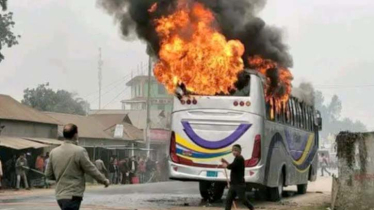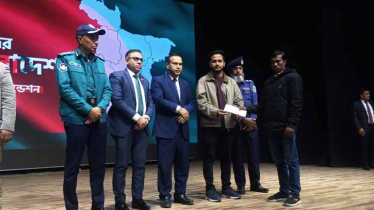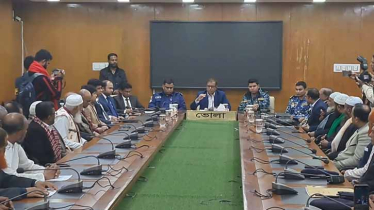
Rohingya people have settled in the hills, particularly at Sarai Lulaing Bangali area of Lama in Bandarban, gradually occupying land that once belonged to local inhabitants, with the support of influential individuals. This migration has caused growing concern among local residents regarding public safety and potential land disputes. Photo :TDM
Rohingyas who fled from Myanmar due to repression have been accused of moving from the Ukhiya Kutupalong and Balukhali refugee camps to settle in the hills. This migration has caused growing concern among local residents about public safety and potential land disputes.
According to sources, over 30 Rohingya families have reportedly settled in the Lulaing Bangali Bazar area of Sarai Union, Lama Upazila, within the past year. Members of the local Murung community have come forward to highlight the issue, stating that the influx of Rohingyas has raised security risks in the area.
Chinglock Murung, President of Lulaingmukh Buddhist Vihar, expressed his concern about the safety of the region, asserting that the arrival of Rohingyas has threatened public security. Numerous locals, including Menwai Murung, Rengdon Murung, Chongraing Murung, and Mangchong Murung, confirmed the settlement of Rohingya families and claimed that influential figures were facilitating their relocation to protect their land and resources.
The Rohingyas have reportedly sought the help of a broker named Hamid Hossain from the neighboring Chakaria Upazila's Manikpur area. With the support of influential individuals, they have been able to settle in the region, gradually occupying land belonging to the local inhabitants.
One of the key issues raised by the locals is the alleged violent behavior of the Rohingya settlers. They claim that the Rohingyas have verbally threatened and assaulted them, raising fears for their safety and wellbeing. Advocate Mukbul Hossain, whose land has been occupied by at least 15 Rohingya families, attested to the threats posed by the newcomers.
Chinwai Mro, a grocer in Lulaing market, lamented the economic impact of the influx. He revealed that local residents have struggled to find work, as the Rohingyas are willing to work for meager wages, causing a decline in daily wage opportunities for the locals. The labor market has seen a significant shift, further exacerbating the economic strain on the indigenous population.
Disturbingly, there are also reports of the Rohingyas becoming involved in drug and arms trade in the hills. Some years ago, a person named Barmaiya Abul Hossain was apprehended by the army with weapons in the Lulaing Meraitta area. Additionally, locals claimed that individuals such as Hamid Hossain, Barmaiya Tarek, and Ali Ahmed have collected donations on behalf of terrorist organizations. Moreover, an unsolved murder involving a Rohingya in Sarai Amtali area has added to the growing unease about the situation.
Remarkably, several Rohingyas have managed to obtain national identity cards (ID cards), raising questions about their citizenship status. Tarek Hossain, known to the locals as a Rohingya, acquired a national identity card from the Panchlaish area of Chittagong City Corporation, allowing him to participate in voting. This apparent exploitation of loopholes in voter registration has fueled concerns that the Rohingyas may be attempting to influence local politics.
In response to the issues, residents have appealed to the authorities to take swift action to address the situation. However, the influx of Rohingyas into inaccessible areas in the mountains has made it challenging for law enforcement to take immediate action.
Local police officer in charge, Shamim Sheikh, assured the public that several Rohingyas have already been arrested and sent to refugee camps by Lama police station. However, he acknowledged that the matter in the Lulaing area had not been previously reported. The Upazila Executive Officer, Md. Mostafa Javed Kaiser, emphasized the seriousness of the situation and pledged to engage in discussions with district administration officials to find a solution.
TDM/SD

